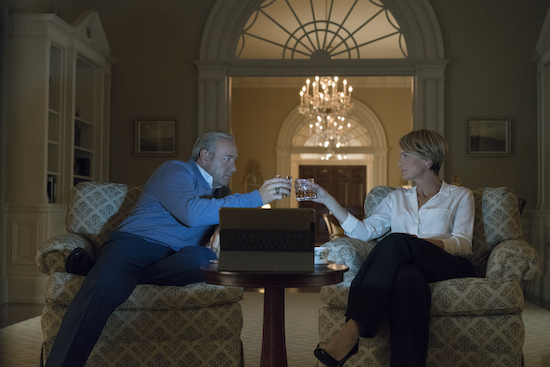I have a confession to make regarding the most well-loved US TV political drama of the century so far; I never liked The West Wing.
I’m nowhere near the first person to make this observation, but Aaron Sorkin’s masterfully written and wonderfully staged White House always seemed to me an exercise in reassurance. "Don’t worry", it seemed to say, "any given president is probably a stand-up guy, and any given apparatchik will, under his fatherly guidance, do the right thing in the end".
There was some griping from the right that it fetishised liberal politics, but Martin Sheen’s President Bartlett was also a family man, staunch constitutionalist and stickler for the rule book, making him a popular figure among conservatives too. What the show really fetishised was the presidency itself; the founding fathers’ civic design; the notion of public service as virtuous self sacrifice.
While these are all indeed laudable notions, and imagining such a world is a worthwhile thought experiment, it never seemed to me able to sink its teeth into US politics. The good guys always prevailed eventually, the bad guys weren’t really bad, not deep down, and there’s nothing that much to worry about, with Cool Dad in charge of everything.
This is not a criticism that could be levelled at House Of Cards, the US-based re-imagining of the early 90s BBC parliamentary drama. Within the first two seasons of the show, protagonist Frank Underwood (Kevin Spacey) had murdered two people with his own hands, and schemed and blackmailed his way into the vice presidency and then presidency. Underwood is solely interested in the pursuit of power at any and all costs, and achieves this by ruthlessly exploiting the venality of those around him. No-one in the show is wholly good, but plenty of them are wholly bad.
Of course, this means House Of Cards is just as unreal as The West Wing, in a different manner, but it does enable the show to dig around in the muck in ways in which its predecessor never could. Bartlett-style stirring speeches are presented as sham trickery to sway the gullible, while the real work of politics is show to be in backroom dealing, the giving and withdrawing of favours, and outright intimidation.
The show has never been a direct commentary on any given presidency. Despite its contemporary setting, and barely-alternate world, it didn’t spend its first four seasons particular alignment with events in the Obama White House. So it’s no surprise that the fifth season doesn’t directly approach the matter of President Trump.
Taken simply as dramatic entertainment, season 5 finds the show in fine form, now fully back from its third season doldrums. Long-standing plot strands are woven back in in surprising ways; Spacey’s central performance has never been more sneeringly malevolent; Robin Wright’s as First Lady Claire Underwood never more icily amoral. It even finds fresh ways to approach the show’s signature tick of having Underwood directly address the viewer, especially in an early scene in which Underwood details his utter contempt for the political establishment around him.
There are a handful of Trumpian details sprinkled throughout. The season’s opening scene shows Underwood displaying a wild disregard for congressional process; there’s a discussion with a legal advisor about closing US borders (Underwood is told it’s inadvisable, but demands it anyway); there’s a press conference with some anger at "fake intelligence". Underneath all this runs the most obviously Trump-inspired strand: Underwood is trying to block an investigation into himself, barely staying one step ahead of congress all the time.
Overall though, the show remains true to its characters and narrative direction of travel. It’s a fairly standard-issue Shakespearean tale showing us how power corrupts, and saying little else, but executed with incredible brio. If you liked any of the previous seasons, you will find much here to savour.
The problem with – or perhaps limitation of – the show in the political context of 2017 is that it’s describing a world that currently doesn’t exist. Frank Underwood may share with Trump a desire for power to no end other than his own amusement and assertion of ego, but that’s all.
Firstly, while Underwood is a power-fixated sociopath of seemingly no scruples, House Of Cards features almost no corruption, in the grubby cash-and-career-breaks sense. Underwood’s motivations are not admirable, but he’s certainly not in it for the money. His contempt for the show’s Putin analogue is palpable, and he’s in hock to nobody. And he speaks in beautifully composed sentences, rich with allusion, mining a deep seam of American history.
Also, Underwood is a congressional chess-master, with the majority of his manipulations invisible even to those closest to him, not something that could be said about Trump, who simply can’t keep his mouth shut about his latest morally and legally dubious moves. His press secretary, Seth (Derek Cecil) may be a jaded careerist of no ethical conviction, but he is a respected master of the dark media arts, severely limiting his utility as an analogue for Sean Spicer. Campaign manager and strategist Leann (Neve Campbell) is a slickly anonymous figure, right at the centre of things, yet never in the public eye, servicing the Underwoods with her incredible command of up-to-the-minute facts. Which is to say, she ain’t no Kellyanne Conway.
House Of Cards has, given the way the world has changed around it, become the minor-key reprise of The West Wing. It depicts a Washington in which, whatever the level of moral decrepitude, a near-universal hyper-competence carries the day. Everyone is stone-cold brilliant at what they do, and the institutional structures remain as robust as those of Jed Bartlett’s most feverish dreams. So in a dark and perverse way, it reassures more than it unsettles.
Meanwhile, in the less-impressive parallel universe we actually live in, around 400 of the key White House roles that require senate confirmation have not even had nominees put forward, and there are no signs that Trump plans to get on with this any time soon. The White House is leaking like radioactive waste stored in an old sock, the president appears to have begun tweeting in an imaginary language (whatever else happens, we’ll always have "covfefe"), the FBI is investigating Trump even harder after he fired the head of the FBI for investigating him, and impeachment and criminal proceedings are now being openly talked about even by congressional republicans.
So, House Of Cards season five, then. An absolutely gripping piece of TV drama, and perhaps its best season since the first. But there’s no way it can compete with the daily twists and turns coming from the real White House. Which, to be fair, you’d laugh off the screen in a drama for their sheer implausibility.
Obama famously commented that as much as he admired the show, people would be disappointed if they found out how boring day-to-day Washington affairs are. Well, nobody’s bored now.



